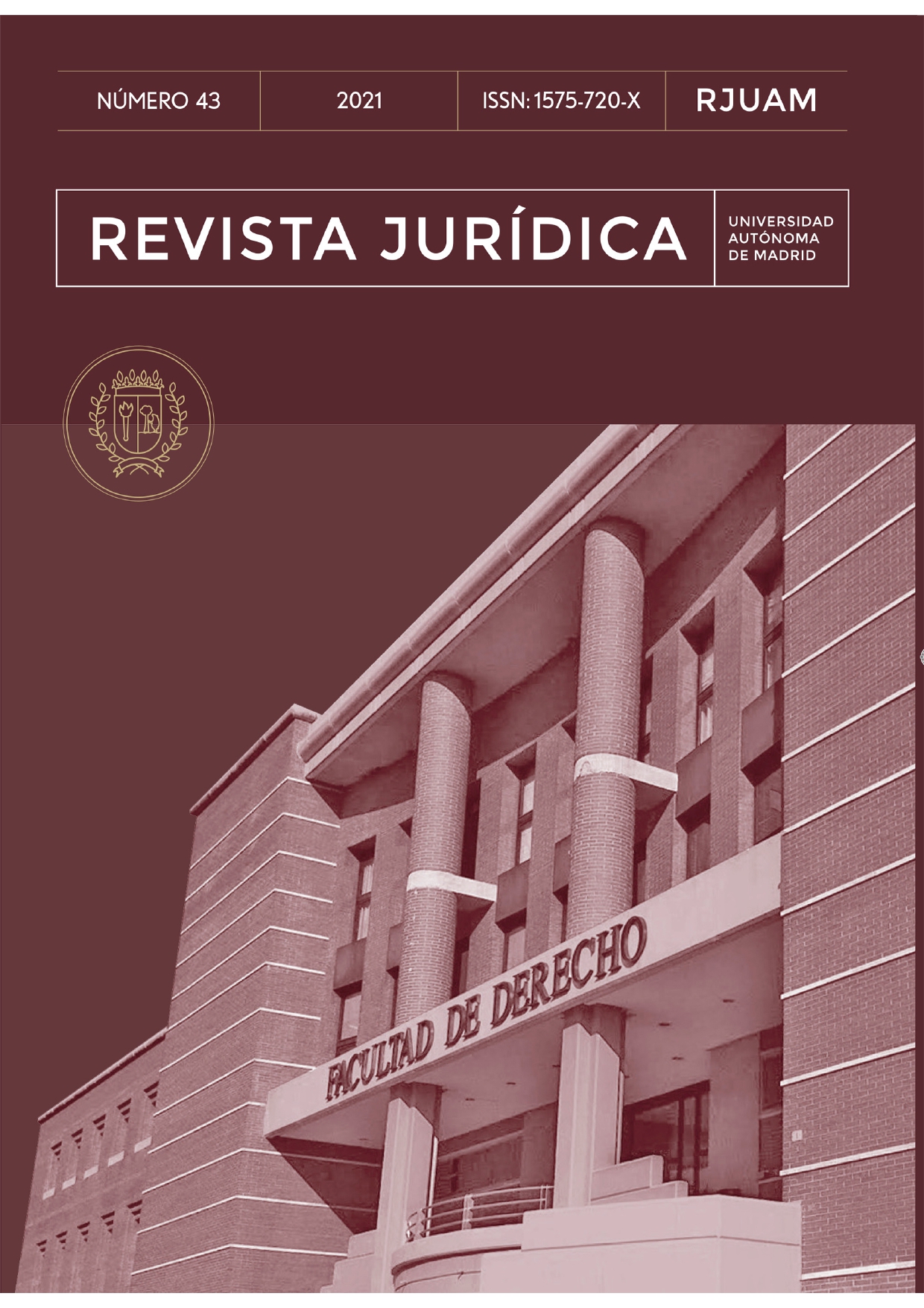Keywords:
populism, ideology, parties, Poland, SlovakiaCopyright (c) 2021 Revista Jurídica Universidad Autónoma de Madrid

This work is licensed under a Creative Commons Attribution-NonCommercial-NoDerivatives 4.0 International License.
Abstract
Populism in Europe has concentrated mainly in the East and has manifested itself through right-wing parties. However, studies on this part of the continent in comparison with the West are scarce. In order to gain insight into populism in this zone, an exceptional case of a left-wing populist party in Slovakia, the SMER-SD, is analyzed. The results show how, since inception in 2014, the Slovak party becomes a «hybrid populist», left-wing on economic policy grounds and culturally conservative, shifting closer to more common populist parties in the region, like the PiS in Poland. Furthermore, the voters of the SMER-SD already had populist attitudes before, which allows us to infer that this ideological shift helped the party to prevent its total decline and to maintain a good part of its electoral support in subsequent elections.
Downloads
References
ASLANIDIS, P., «Is populism an ideology? A refutation and a new perspective», Political Studies, núm. 64, 2016, pp. 88-104.
BARTOLINI, S., & MAIR, P., «Policy competition, spatial distance and electoral instability», West European Politics, vol. 13, núm. 4, 1990, pp. 1-16.
BERAMENDI, P., HÄUSERMANN, S., KITSCHELT, H., & KRIESI, H., The politics of advanced capitalism (Cambridge University Press), 2015.
CASAL BÉRTOA, F., Sources of Party System Institutionalization in New Democracies: Lessons from East Central Europe, 1.ª ed., Ciudad Autónoma de Buenos Aires (Edeba), 2016.
EIERMANN, M., MOUNK, Y., & GULTCHIN, L., «European Populism: Trends, Threats and Future Prospects», Tony Blair Institute for Global Change, núm. 29, 2017.
ERREJÓN, Í., & MOUFFE, C., Construir pueblo. Hegemonía y radicalización de la democracia (Icaria Editorial), 2015.
FERRERO, R., «Elecciones en Eslovaquia: nacionalismo y xenofobia ganan la partida», entrada de periódico de 8 de marzo de 2016. Disponible en .
GHERGHINA, S., MI?COIU, S., & SOARE, S., «How far does nationalism go? An overview of populist parties in central and eastern Europe», Political populism, Nomos Verlagsgesellschaft Mbh y Co. KG, 2017, pp. 193-208.
HALIKIOPOULOU, D., «Populistas de extrema derecha», entrada de periódico de 3 de junio de 2019. Disponible en <https://elpais.com/elpais/2019/06/01/opinion/1559407218_218443.html>.
HENLEY, J., «How populism emerged as an electoral force in Europe», entrada de periódico de 20 de noviembre de 2018. Disponible en: <https://www.theguardian.com/world/nginteractive/2018/nov/20/how-populism-emerged-as-electoral-force-in-europe>.
HLOUŠEK, V., «European integration as a party cleavage? A conceptual debate», 2017. Disponible en <http://cepsa.at/ablage/ 2011/paper_hlousek.pdf.>.
HOOGHE, L., & MARKS, G., «Cleavage theory meets Europe’s crises: Lipset, Rokkan, and the transnational cleavage», Journal of European Public Policy, vol. 25, núm. 1, 2018, pp. 109-135.
IONESCU, G., y GELLNER, E. Populism: its meaning and national characteristics, (eds.) (Macmillan), 1969.
KOEV, D., «Interactive party effects on electoral performance: How ethnic minority parties aid the populist right in Central and Eastern Europe», Party Politics, vol. 21, núm. 4, 2015, pp. 649-659.
KOSTELKA, F., y ROVNY, J., «It’s Not the Left: Ideology and Protest Participation in Old and New Democracies», Comparative Political Studies, vol. 52, núm. 11, 2019, pp. 1677-1712.
KREKÓ, P., «La situación de la izquierda en el grupo de Visegrado: panorama tras el desastre en Hungría», Temas para el debate, núm. 287, 2018, p. 41.
KRIESI, H., y PAPPAS, T., European populism in the shadow of the great recession (ECPR Press), 2015.
MARCH, L., Radical left parties in Europe (Routledge), 2012.
MUDDE, C., «The populist zeitgeist», Government and opposition, vol. 39, núm. 4, 2004, pp. 541-563.
MUDDE, C., y ROVIRA KALTWASSER, C., «Studying populism in comparative perspective: Reflections on the contemporary and future research agenda», Comparative Political Studies, vol. 51, núm. 13, 2018, pp. 1667-1693.
LACLAU, E., On populist reason (Verso), 2005.
ORTIZ DE ZÁRATE, R., «Robert Fico», entrada de blog de 27 de marzo de 2018. Disponible en <https://www.cidob.org/biografias_lideres_politicos/europa/eslovaquia/robert_fico>.
ORTIZ DE ZÁRATE, R., «Beata Szydlo», entrada de blog de 3 de julio de 2019. Disponible en <https://www.cidob.org/biografias_lideres_politicos/europa/polonia/beata_szydlo>.
PINTERI?, U., & ŽÚBOROVÁ, V., «Party arenas in Slovenia and Slovakia», Društvena istraživanja: ?asopis za op?a društvena pitanja, vol. 23, núm. 2, 2014, pp. 349-368.
PIRRO, A., «Digging into the breeding ground: insights into the electoral performance of populist radical right parties in Central and Eastern Europe», East European Politics, vol. 30, núm. 2, 2012, pp. 246-270.
RIVERO, Á., ZARZALEJOS, J., y DEL PALACIO, J., Geografía del populismo, Madrid (Tecnos), 2017.
ROVIRA KALTWASSER, C., «Explicando el populismo», entrada de blog de 30 de mayo de 2016. Disponible en <https://agendapublica.es/explicando-el-populismo/>.
ROVNY, J., «Riker and Rokkan: Remarks on the strategy and structure of party competition», Party Politics, vol. 21, núm. 6, 2015, pp. 912-918.
SANTANA, A., y RAMA, J., «Electoral support for left wing populist parties in Europe: addressing the globalization cleavage» European Politics and Society, vol. 19, núm. 5, 2018, pp. 558-576.
“DIRECCIÓN – SOCIALDEMOCRACIA <http://www.ceeidentity.eu/database/manifestoescoun/direction>.
“EUROPEAN SOCIAL SURVEY, ROUND 6” <https://www.europeansocialsurvey.org/data/download.html?r=6>.
PARTIDO LEY Y JUSTICIA <http://pis.org.pl/partia/prawo-i-sprawiedliwosc/ >.
TSAKATIKA, M., entrada de periódico de 16 de noviembre de 2016. «El populismo no es una ideología, sino que se nutre de otras ideologías», entrada de blog de 16 de noviembre de 2016. Disponible en <http://agendapublica.elpais.com/el-populismo-no-es-una-ideologia-sino-que-se-nutre-de-otras-ideologias/>.
ZAGÓRSKI, P., y SANTANA, A., «Exit or Voice: Abstention and Support for Populist Radical Right Parties in Central and Eastern Europe», Problems of Post-Communism, vol. 68, núm. 4, 2021, pp. 264-278.
ZALA, B., «La situación de la izquierda en el grupo de Visegrado: paradojas de la izquierda eslovaca», Temas para el debate, núm. 287, 2018.
ZASLOVE, A., «Here to Stay? Populism as a New Party Type», European review, vol. 16, núm. 3, 2008, pp. 319-336.
